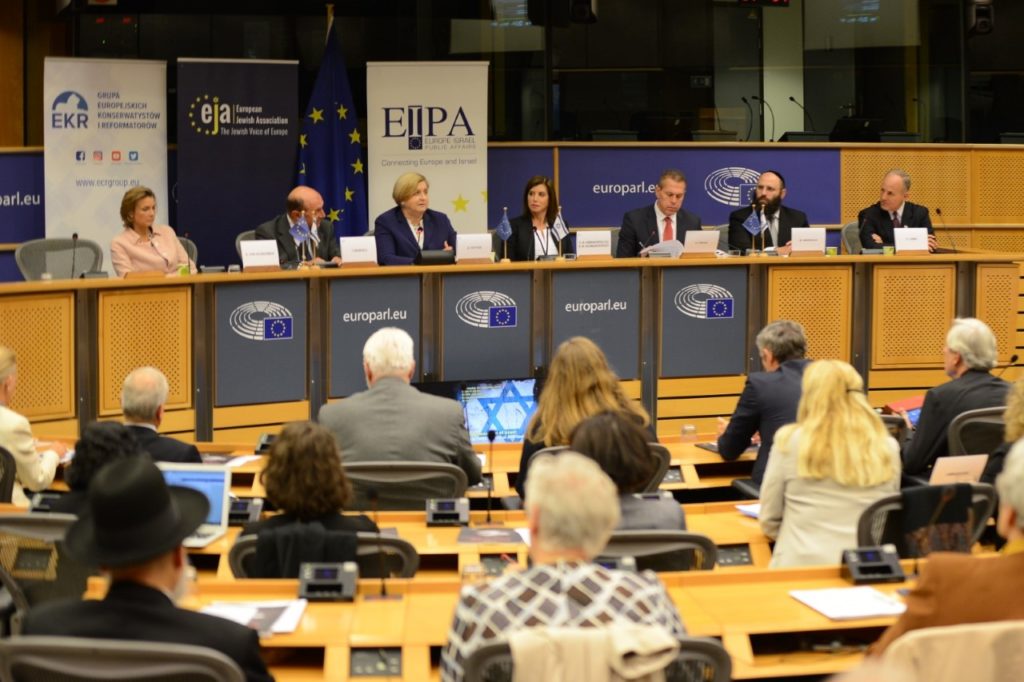The BDS-movement, which calls for boycott, disinvestment and sanctions against Israel, spreads anti-Semitism behind a mask of liberal values and human rights. At meetings on Wednesday in Brussels Press Club and the European Parliament, Israel´s Minister of Strategic Affairs Gilad Erdan presented a report purporting to disclose the anti-Semitic nature of the BDS-movement.
“We have proven beyond a doubt that BDS is an anti-Semitic campaign led by supporters of terror with one purpose: the elimination of the Jewish State. I urge Western countries not to take part in the anti-Semitic lies of BDS, not to legitimize its racism, and surely not fund it,” he said.
The movement was founded in 2005 and has officially three objectives: ending the Israeli occupation of Palestinian territories, achieving equality between Jews and Palestinians in Israel and implementing the right of return of the Palestinian refugees. To achieve its objectives, it calls for an economic, cultural and economic boycott of Israel.
While this does not necessarily qualify as anti-Semitism, the report documents for the first time numerous examples where BDS-members and its supporters in Europe are using anti-Semitic stereotypes and tropes to delegitimize Israel, thus contributing to the rise of anti-Semitism.
A previous report by the Israeli ministry showed links between BDS-members and terrorist organisations. This did not prevent Spanish MEP Manu Pineda (GUE/NGL) last July to invite BDS-activist Khaled Barakat with alleged terror links to the European Parliament. Such invitations are banned by the parliament. Pineda did not respond to repeated questions from The Brussels Times.
The examples in the new report are divided into three main sections: expressions of classic anti-Semitism; Holocaust inversion, where Israel is compared to Nazi-Germany; and denial of the Jewish people's right to self-determination. All these are forms of anti-Semitism according to a definition which has been endorsed by the European Council and adopted by several EU Member States.
One of the co-founders of the BDS-movement, Omar Barghouti, who was invited to the European Parliament last year, is quoted as having said, “we definitely oppose a Jewish state in any part of Palestine”. A mass return of refugees to Israel would transform the Jews to a minority in their own country and is the opposite of any two-state solution.
Paradoxically, the movement mirrors the current Israeli government position which does not distinguish clearly between Israel within the border before the 1967 war and the settlements on the West Bank. An Israeli law bans the entry to the country of not only BDS-members but anyone who supports a boycott of products from the settlements.
The Israeli minister said that Israel accepts legitimate criticism of its policies but did not respond to requests by The Brussels Times for an interview. Even legitimate criticism might easily be dismissed as motivated by anti-Semitism because of the BDS-movement’s extreme rhetoric.
An EU spokesperson told The Brussels Times that EU and its member states reject the attempts by the BDS campaign to isolate Israel and is opposed to any boycott of Israel. “EU does not fund actions that are related to boycott activities and any allegations of the EU supporting incitement or terror are unfounded and unacceptable.”
That said, “EU stands firm in protecting freedom of expression and association. Any action that has the effect of closing the space for civil society organisations should be avoided.”
According to the spokesperson, EU has offered the Israeli government to discuss and investigate any cases of alleged EU-funding to the BDS-movement. Some Member States have been allocating grants to organisations supporting BDS-related activities but according to NGO Monitor, an Israeli research institute, these countries have largely stopped the funding.
M. Apelblat
The Brussels Times

